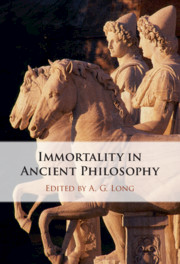Book contents
- Immortality in Ancient Philosophy
- Immortality in Ancient Philosophy
- Copyright page
- Contents
- Contributors
- Introduction
- Chapter 1 The Soul and the Celestial Afterlife in Greek Philosophy before Plato
- Chapter 2 Pythagorean Immortality of the Soul?
- Chapter 3 The Philosopher’s Reward: Contemplation and Immortality in Plato’s Dialogues
- Chapter 4 Pre-Existence, Life after Death, and Atemporal Beings in Plato’s Phaedo
- Chapter 5 The Immortal and the Imperishable in Aristotle, Early Stoicism, and Epicureanism
- Chapter 6 Socrates and the Symmetry Argument
- Chapter 7 Immortality in Philo of Alexandria
- Chapter 8 Plotinus on Immortality and the Problem of Personal Identity
- Chapter 9 Truth and Immortality in Augustine’s Soliloquies and De Immortalitate Animae
- Index of Passages
- Index of Names and Subjects
- References
Chapter 1 - The Soul and the Celestial Afterlife in Greek Philosophy before Plato
Published online by Cambridge University Press: 20 May 2021
- Immortality in Ancient Philosophy
- Immortality in Ancient Philosophy
- Copyright page
- Contents
- Contributors
- Introduction
- Chapter 1 The Soul and the Celestial Afterlife in Greek Philosophy before Plato
- Chapter 2 Pythagorean Immortality of the Soul?
- Chapter 3 The Philosopher’s Reward: Contemplation and Immortality in Plato’s Dialogues
- Chapter 4 Pre-Existence, Life after Death, and Atemporal Beings in Plato’s Phaedo
- Chapter 5 The Immortal and the Imperishable in Aristotle, Early Stoicism, and Epicureanism
- Chapter 6 Socrates and the Symmetry Argument
- Chapter 7 Immortality in Philo of Alexandria
- Chapter 8 Plotinus on Immortality and the Problem of Personal Identity
- Chapter 9 Truth and Immortality in Augustine’s Soliloquies and De Immortalitate Animae
- Index of Passages
- Index of Names and Subjects
- References
Summary
This study examines the evidence for the celestial afterlife in Greek philosophy before Plato. Starting from Plato’s Phaedo myth, where we find evidence for three levels of life for souls (our level, the ‘aithêr-dwellers’ above us, and, above that, a more mysterious third level), it argues that such a stratified cosmos was not original to Plato, but can be found in certain of his predecessors. The two best-documented instances of it occur in Heraclitus and the new, Strasbourg papyrus of Empedocles. Both thinkers, in attempting to frame the place of soul in the order of nature, also adopt a stratified, hierarchical cosmic scheme, with rewards and demotions along the vertical axis. But they also thereby take up positions on the nature of soul: What stuff is it made of? Is it (essentially) immortal or not? And if not, can its immortality be secured? Against Plato’s later doctrine of an essentially immortal soul, both conceive of soul as somehow physical and, for different reasons, appear to deny its full or essential immortality.
- Type
- Chapter
- Information
- Immortality in Ancient Philosophy , pp. 12 - 40Publisher: Cambridge University PressPrint publication year: 2021

